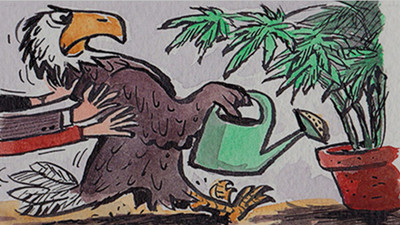“毒品”政策
Marijuana milestone
大麻合法化的里程碑
Almost half of American states have taken steps to legalise cannabis. The federal government should follow
美國幾乎一半的洲都已經步入了大麻合法化的大門。聯邦政府也應該緊隨大流。
BESIDES choosing lawmakers, on November 4th voters in three American states and the District of Columbia considered measures to liberalise the cannabis trade. Alaska and Oregon, where it is legal to provide “medical marijuana” to registered patients, voted to go further and let the drug be sold and taken for recreational purposes, as Colorado and Washington state already allow. In DC, a measure to legalise the possession of small amounts for personal use was passed. A majority of voters in Florida opted to join the lengthening list of places where people can seek a doctor's note that lets them take the drug. However, the measure fell just short of the 60% needed to change the state constitution. Even so, that such a big state in the conservative South came so close to liberalising shows how America's attitude to criminalising pot has changed.
除了選擇國會議員,11月4日美國三大洲以及哥倫比亞地區的選民們考慮開放大麻自由貿易。在阿拉斯加和俄勒岡對已注冊病人提供“醫用大麻”是合法的,他們希望像科羅拉多和華盛頓已經實行的一樣,可以通過投票進一步的允許買賣以及娛樂用途。在華盛頓,把私人擁有少量大麻作為權衡合法化的標準提議已經被通過。弗羅里達的大多數選民們希望越來越多的地方可以遵醫囑使用醫用大麻。然而,這種方法還是沒有成功,畢竟需要60%選民的贊成來改變憲法。即便如此,在保守的南方如此一個大洲差一點就通過議案,顯示了美國對毒品罪的定義已經發生了改變。

After this week's votes only 27 states outlaw all sale or possession of marijuana. In the rest, a thriving “canna-business” is emerging: trade in the drug is escaping the grasp of organised crime and becoming normal, just as alcohol did after the end of Prohibition. But even as moves to legalise and regularise the business continue at state level, the federal government and Congress remain dead set against the drug. A panoply of federal laws to curb the marijuana trade remain in place; and in recent months the Drug Enforcement Administration has raided cannabis dispensaries in California that are operating under state licences.
經過一個星期的選舉,僅僅有27個洲禁止出售或擁有大麻。在剩下的洲,“大麻事業”蒸蒸日上:正如酒精被解禁后一樣,毒品交易從有組織的犯罪變為正常現象。但是盡管州級政府循規蹈矩的進行大麻交易,但聯邦政府和國會仍然堅決反對毒品。完善的聯邦法律時刻準備著遏制大麻交易。最近幾個月美國禁毒局搜查了加利福利亞在政府許可下經營的大麻藥房。
The cannabis industry is now in a legal no-man's-land. In some states the distinction between medical and recreational use is hazy: just fake a back problem and you can join the ranks of licensed pot-heads. Entrepreneurs are creating a range of products that is, literally, mind-blowing: not just smokes, but cannabis cakes, chocolates and massage oils. Yet even where state governments allow people to partake of the weed for pleasure, growers and sellers face the constant threat of seizure or arrest by the Feds. National laws make it hard for them to open bank accounts or get credit, and thus to rent premises or invest in production. They cannot sell across state lines.
大麻產業正處于合法和非法的灰色地帶。在一些洲,醫用和娛樂用處界限模糊不清,只要聲稱背痛就可以當合法的“癮君子”。企業家們正生產一系列產品,美其名曰:讓人興奮:不僅僅是大麻煙,還有大麻蛋糕,巧克力和大麻按摩油。然而即使在那些政府允許人們享用大麻的地方,種植者和售賣者仍要面對聯邦政府一系列的威脅或逮捕危險。聯邦法律讓他們很難在銀行開戶或貸款來租用場地或進行投資生產。他們也不能跨界銷售。
This makes it harder for the business to distance itself from the criminal underworld, which is one of the main purposes of legalisation. It also has safety implications. Smaller states will struggle to monitor quality standards and set safe doses for the huge variety of marijuana products coming to market. The federal Food and Drug Administration—the world's foremost regulator of drug safety—refuses to inspect the cottage industry for fear of legitimising it. (Strangely enough, such qualms do not deter the Internal Revenue Service, which readily taxes the proceeds.)
這讓大麻商業更難從地下黑市脫離出來,這也是使之合法化的主要原因之一。同樣還有安全劑量監控。較小的洲應該加強對質量標準的監控,并且對大量涌入市場的各式各樣的大麻產品設置安全劑量標準。聯邦食品和藥物管理局—是世界上最具權威的藥品安全監督機構,拒絕檢查這種家庭式產業,以防其合法化。(奇怪的是,這些疑慮仍然沒有阻止國家稅務局對該行業實行稅收的腳步)
Marlboro, man
萬寶路和人
Opponents of legalisation are happy to see the business stay small, amateurish and nervous. They argue that if it got into the hands of giant corporations with big marketing budgets, as tobacco and alcohol have, pot use would surge. However, the weed business is already vast—worth some 40 billion by one estimate—and it is largely in the hands of gangs that, unlike big, stockmarket-listed firms, would not hesitate to sell dodgy stuff, to youngsters as well as adults. A legal, well-regulated pot industry would be a safer, less crime-infested one, but it would not necessarily be a bigger one: tobacco use has plunged as regulation has been tightened and public education about its health risks has improved.
反對其合法化的民眾們很樂意看到大麻商業無法擴大,無法專業化,永遠暗無天日。他們認為就如香煙和酒一樣,如果讓擁有大市場份額的公司參與進來,那么大麻的消費將劇增。然而,大麻商業已經是巨大的,有人估計大約價值四百億美元,而其中大部分是掌握在那些團伙手中,不像大的上市公司一樣,他們會毫不猶豫的將劣質產品賣給年輕人和成人。良好的合法監督將有利于提供一個更安全的產業環境,少一些犯罪,而不是不可避免的擴大。隨著監管的不斷加強,關于大麻對健康危害的公共教育不斷提高,香煙的消費也會驟減。
The federal government and Congress should face up to the reality that across swathes of America, pot is now all but legal—and voters want it that way. They should redirect their efforts to making it as well-regulated as booze and cigarettes.
聯邦政府和國會應該面對現實,在遼闊的美國土地上,大麻已經站穩腳跟,只等其合法化,這也是選民的意愿。他們應該調轉船頭,改變策略,像管理酒和香煙一樣好好管理大麻。譯者:黃梅












